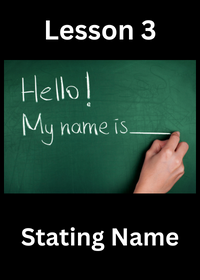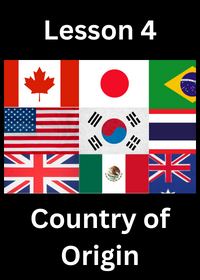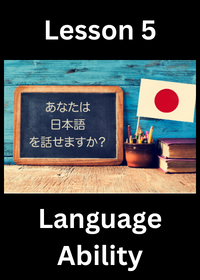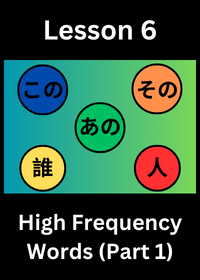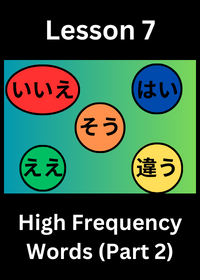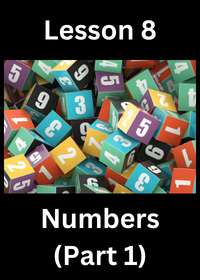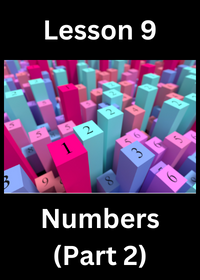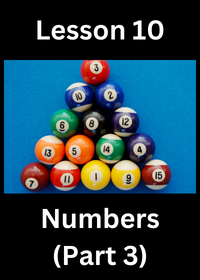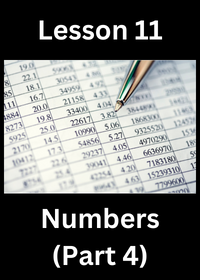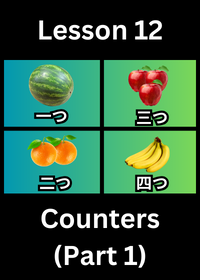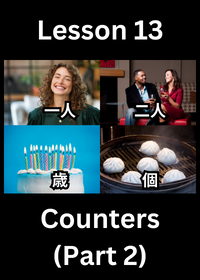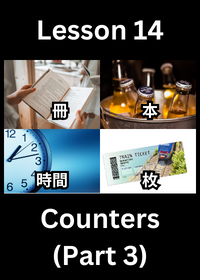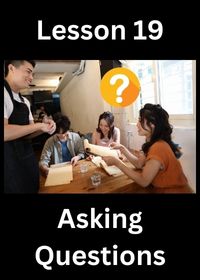Japanese Vocabulary Lessons
Overview
- The Japanese vocabulary lessons provide curated vocabulary lists, native recordings, example sentences and language notes with a focus on helping you acquire practical Japanese language skills
- Lessons are organized into sections which consist of seven lessons which provide an concise introduction to a specific topic, skill, or area of Japanese.
- After completing a lesson, you can review the material using our interactive quizzes which function as digital flashcards to help you retain what you have learned
Section 1
Section 2
Section 1:
Introducing Yourself
In this section you will learn some essential Japanese conversation skills that are frequently used when meeting new people. First, you will learn some greetings (i.e. ‘hello’, ‘goodbye’, ‘good morning’) and common expressions (i.e. ‘thank you’, ‘I’m sorry’, ‘Excuse me’). Next, you will learn how to properly introduce yourself and give some basic information about yourself, such as your name and nationality. Then, you will learn how to answer the question ‘Where are you from?’ You will also learn how to ask ‘Can you speak English?’ and state ‘I can’t speak Japanese.’ Finally, you will learn some high frequency words (‘yes’, ‘no’, ‘this’, ‘that’) that you can use for answering simple questions and identifying people or things.
Vocabulary Preview
Lesson 1: Greetings (Part 1)
--------------------------------
1. Hello/Good afternoon
--------------------------------
(こんにちは)
[konnichiwa]
--------------------------------
2. Good morning
--------------------------------
(おはようございます)
[ohayou gozaimasu]
--------------------------------
3. Good evening
--------------------------------
(こんばんは)
[konbanwa]
--------------------------------
4. I'm sorry/Excuse me
--------------------------------
(すみません)
[sumimasen]
--------------------------------
5. Goodbye
--------------------------------
(さよなら)
[sayonara]
--------------------------------
Lesson 2: Greeting (Part 2)
--------------------------------
1. How do you do
--------------------------------
(はじめまして)
[hajimemashite]
--------------------------------
2. I'm looking forward to meeting you
--------------------------------
(よろしくおねがいします)
[yoroshiku onegaishimasu]
--------------------------------
3. You're welcome
--------------------------------
(どういたしまして)
[douitashimashite]
--------------------------------
4. I'm sorry
--------------------------------
(ごめんなさい)
[gomen nasai]
--------------------------------
5. Thank you
--------------------------------
(ありがとうございます)
[arigatou gozaimasu]
--------------------------------
Lesson 3: My Name
--------------------------------
1. I/me
--------------------------------
(わたし)
[watashi]
--------------------------------
2. You
--------------------------------
(あなた)
[anata]
--------------------------------
3. Name
--------------------------------
(なまえ)
[namae]
--------------------------------
4. Who (formal)
--------------------------------
(どなた)
[donata]
--------------------------------
5. American
--------------------------------
(あめりかじん)
[amerikajin]
--------------------------------
Lesson 4: Country of Origin
--------------------------------
1. America
(あめりか)
[amerika]
--------------------------------
2. Japan
--------------------------------
(にほん)
[nihon]
--------------------------------
3. to come
--------------------------------
(くる)
[kuru]
--------------------------------
4. Country
--------------------------------
(くに)
[kuni]
--------------------------------
5. Where
--------------------------------
(どこ)
[doko]
--------------------------------
Lesson 5: Language Ability
--------------------------------
1. English
--------------------------------
(えいご)
[eigo]
--------------------------------
2. Japanese
--------------------------------
(にほんご)
[nihongo]
--------------------------------
3. to understand
--------------------------------
(わかる)
[wakaru]
--------------------------------
4. to speak
--------------------------------
(はなす)
[hanasu]
--------------------------------
5. to be able to do
--------------------------------
(できる)
[dekiru]
--------------------------------
Lesson 6: High Frequency Words (Part 1)
--------------------------------
1. Who
--------------------------------
(だれ)
[dare]
--------------------------------
2. Person/People
--------------------------------
(ひと)
[hito]
--------------------------------
3. This
--------------------------------
(この)
[kono]
--------------------------------
4. That
--------------------------------
(その)
[sono]
--------------------------------
5. That (over there)
--------------------------------
(あの)
[ano]
--------------------------------
Lesson 7: High Frequency Words (Part 2)
--------------------------------
1. Yes
--------------------------------
(はい/ええ)
[hai/ee]
--------------------------------
2. No
--------------------------------
(いいえ)
[iie]
--------------------------------
3. That's right
--------------------------------
(そう)
[sou]
--------------------------------
4. to be wrong/mistaken
--------------------------------
(ちがう)
[chigau]
--------------------------------
Section 2:
Numbers and Counters
In this section you will learn Japanese numbers. In lessons 8-11, you will learn the basic numbers (1-10, 100, 1,000, 10,000) as well as some irregular numbers (300, 600, 800, 3000, 8000). Next, you will learn about some important Japanese counters, which are used for counting different types of objects.
Vocabulary Preview
Lesson 8: Numbers (Part 1)
--------------------------------
1. One
--------------------------------
(いち)
[ichi]
--------------------------------
2. Two
--------------------------------
(に)
[ni]
--------------------------------
3. Three
--------------------------------
(さん)
[san]
--------------------------------
4. Four
--------------------------------
(よん)
[yon]
--------------------------------
5. Five
--------------------------------
(ご)
[go]
--------------------------------
Lesson 9: Numbers (Part 2)
--------------------------------
1. Six
--------------------------------
(ろく)
[roku]
--------------------------------
2. Seven
--------------------------------
(なな)
[nana]
--------------------------------
3. Eight
--------------------------------
(はち)
[hachi]
--------------------------------
4. Nine
--------------------------------
(きゅう)
[kyuu]
--------------------------------
5. Ten
--------------------------------
(じゅう)
[juu]
--------------------------------
Lesson 10: Numbers (Part 3)
--------------------------------
1. One hundred
--------------------------------
(ひゃく)
[hyaku]
--------------------------------
2. Three hundred
--------------------------------
(さんびゃく)
[sanbyaku]
--------------------------------
3. Six hundred
--------------------------------
(ろっぴゃく)
[roppyaku]
--------------------------------
4. Eight hundred
--------------------------------
(はっぴゃく)
[happyaku]
--------------------------------
5. One thousand
--------------------------------
(いっせん)
[issen]
--------------------------------
Lesson 11: Numbers (Part 4)
1. Three thousand
(さんぜん)
[sanzen]
--------------------------------
2. Eight thousand
--------------------------------
(はっせん)
[hassen]
--------------------------------
3. Ten thousand
--------------------------------
(いちまん)
[ichiman]
--------------------------------
4. Zero
--------------------------------
(ぜろ)
[zero]
--------------------------------
Lesson 12: Counters (Part 1)
1. One item
(ひとつ)
[hitotsu]
--------------------------------
2. Two items
--------------------------------
(ふたつ)
[futatsu]
--------------------------------
3. Three items
--------------------------------
(みっつ)
[mittsu]
--------------------------------
4. Four items
--------------------------------
(よっつ)
[yottsu]
--------------------------------
5. Five items
--------------------------------
(いつつ)
[itsutsu]
Lesson 13: Counters (Part 2)
1. One person
(ひとり)
[hitori]
--------------------------------
2. Two people
--------------------------------
(ふたり)
[futari]
--------------------------------
3. Counter for flat objects
--------------------------------
(まい)
[mai]
--------------------------------
4. Counter for non-flat objects
--------------------------------
(こ)
[ko]
--------------------------------
5. Counter for age
--------------------------------
(さい)
[sai]
Lesson 14: Counters (Part 3)
1. Counter for minutes
(ふん)
[fun]
--------------------------------
2. Counter for hours
--------------------------------
(じかん)
[jikan]
--------------------------------
3. Counter for days
--------------------------------
(にち)
[nichi]
--------------------------------
4. Counter for long objects
--------------------------------
(ほん)
[hon]
--------------------------------
5. Counter for books
--------------------------------
(さつ)
[satsu]
Section 3:
Ordering in a Restaurant
Vocabulary Preview
Lesson 15: Restaurant Dining
--------------------------------
1. to wait
--------------------------------
(まつ)
[matsu]
--------------------------------
2. Reservation/Appointment
--------------------------------
(よやく)
[yoyaku]
--------------------------------
3. Taking out (food)
--------------------------------
(おもちかえり)
[omochikaeri]
--------------------------------
4. Dining in
--------------------------------
(てんない)
[tennai]
--------------------------------
5. Seat
--------------------------------
(せき)
[seki]
--------------------------------
Lesson 16: Ordering Drinks
--------------------------------
1. Water
--------------------------------
(みず)
[mizu]
--------------------------------
2. Drink
--------------------------------
(のみもの)
[nomimono]
--------------------------------
3. Would you like?/How about?
--------------------------------
(いかが)
[ikaga]
--------------------------------
4. Something
--------------------------------
(なにか)
[nanika]
--------------------------------
5. to humbly receive
--------------------------------
(いただく)
[itadaku]
--------------------------------
Lesson 17: Ordering Drinks (Part 2)
--------------------------------
1. Coffee
--------------------------------
(コーヒー)
[ko-hi-]
--------------------------------
2. Tea
--------------------------------
(おちゃ)
[ocha]
--------------------------------
3. Warm
--------------------------------
(あたたかい)
[atatakai]
--------------------------------
4. Cold
--------------------------------
(つめたい)
[tsumetai]
--------------------------------
5. Refill/Extra portion
--------------------------------
(おかわり)
[okawari]
--------------------------------
Lesson 18: Ordering Food
1. Order
(さんぜん)
[sanzen]
--------------------------------
2. Menu
--------------------------------
(はっせん)
[hassen]
--------------------------------
3. to have/exist
--------------------------------
(いちまん)
[ichiman]
--------------------------------
4. Not yet/still
--------------------------------
(ぜろ)
[zero]
5. to be decided
--------------------------------
(きまる)
[kimaru]
--------------------------------
Lesson 19: Asking Questions
1. to do
(する)
[suru]
--------------------------------
2. This
--------------------------------
(これ)
[kore]
--------------------------------
3. That
--------------------------------
(それ)
[sore]
--------------------------------
4. That (over there)
--------------------------------
(あれ)
[are]
Lesson 20: Ordering Food (Part 2)
1. Dessert
(デザート)
[deza-to]
--------------------------------
2. Recommendation
--------------------------------
(おすすめ)
[osusume]
--------------------------------
3. What
--------------------------------
(なに)
[nani]
--------------------------------
4. Good/Fine/OK
--------------------------------
(いい)
[ii]
--------------------------------
5. No thank you
--------------------------------
(だいじょうぶ)
[daijoubu]
Lesson 21: Making Payments
1. Bill
(かいけい)
[kaikei]
--------------------------------
2. Credit Card
--------------------------------
(カード)
[ka-do]
--------------------------------
3. How much
--------------------------------
(いくら)
[ikura]
--------------------------------
4. to use
--------------------------------
(つかう)
[tsukau]
--------------------------------
5. Payment
--------------------------------
(しはらい)
[shiharai]
Copyright © 2024 Little Book of Japan
Copyright © 2024 Little Book of Japan



